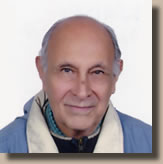
|
| Home | Biography | Publications | Documents & Photos | Contact | ||
APPENDIX 4WADIE PHILISTIN
While the Arabic version of his name “Philistin”, i.e. Palestine, suggests that he could be Palestinian, he is not, though he prides himself of it. He was born at Akhmim in the Province of Sohag in Upper Egypt, to a pure-bred Egyptian Christian Coptic family whose roots go to the town of Naqqada50 in the Province of Qena, not very far from the famous Luxor. A 1942 graduate in Journalism from the American University in Cairo, then a well respected author, teacher and, for the past 67 years a political, economic and literary journalist. Between 1945 and 1952 he worked for the famous Cairo newspapers “Al-Moqtataf” and “Al-Moqattam” where he headed a number of departments and wrote the daily lead editorial, which was regularly quoted by various Arab and foreign media outlets. He is well-known in the Arab world as the author and translator of over forty books in literature, economics, biographies, politics and journalism. He also taught journalism at the American University in Cairo between 1948 and 1957. He also assisted in the compilation of three encyclopaedias: the Encyclopaedia Coptica, published by the University of Utah, the simplified Arabic version of the Columbia Viking Encyclopaedia, The “Encyclopaedia of Egyptian and World Personalities”, and the Arabic version of the Spanish Kombi Illustrated Encyclopaedia. His most recent work, published in 2003, consists of a two-volume anthology of distinguished Arab writers, intellectuals and orientalists he has known throughout his career. It is reported that he was the first to predict that Naguib Mahfouz, the Egyptian winner of the 1988 Nobel Prize in literature, would one day become an international celebrity. Aside from the hundreds of articles he authored and were published around the Arab world, he became the General Manager of the Cairo office of the Arabian-American Oil Company (ARAMCO) and supervised the publication of its monthly Arabic magazine “Qafelat Al-Zayt”, the prestigious sister publication of Aramco World Magazine, which is specialized in the Arab and Muslim cultures and history, and is considered to be the closest thing to a National Geographic. Several writers in Egypt and in other countries have written about Wadie Philistin and his work, such as the full page profile about him written by Ms. Safynaz Kazem and published in the 1996 issue of the Egyptian “Al-Ahram” daily. Ms. Kazem points out that “his intellectual hobby is to hunt down scientific terms which have been overlooked by specialized dictionaries”. She further describes his usage of Arabic as “so elegant (that) it makes those who love the language gasp in wonder…his elegant, witty pen fathoms the depths of the character he depicts, obliterating the barriers between the subject and the reader”. He was eventually elected member of the prestigious Arabic Language Academies of both Syria (1986) and Jordan (1988), though curiously enough not in his own country! Philistin is one of the rare Egyptian writers who have been at home intellectually both in Egypt and the rest of the Arab World. Like Eltaher, he has a wider vision of the world around him, and did not fall victim to national introversion. While some people pigeon-hole themselves under this or that religious label, he was intellectually beyond all that, and those he dealt with were almost all in that category. This was the era of pan Arab intellectualism, when certain men and women had freed themselves from the constraints of narrow-mindedness and suffocating ‘localitis’. Wadie Philistin and Eltaher were very good friends and maintained a long-lasting correspondence during the life-time of the latter. As ever and whenever he could, he never misses mentioning his friend Eltaher and “Dar Ashoura”. Like his friend, and like so many other thinkers, he was imprisoned and treated ignominiously. Three generations of Egyptians have never heard of him, and, like Safynaz Kazem, are just discovering him. Wadie Philistin, who is over eighty years old at time of writing in 2010, maintains an active correspondence, and continues to write, translate and participate in literary conferences in Egypt and overseas. Now that he has been “rediscovered”; his cultural articles and literary reviews have reappeared in Egyptian publications.
|
| © 2025 PHP: 8.0.30 Eltaher.org | Contact |
